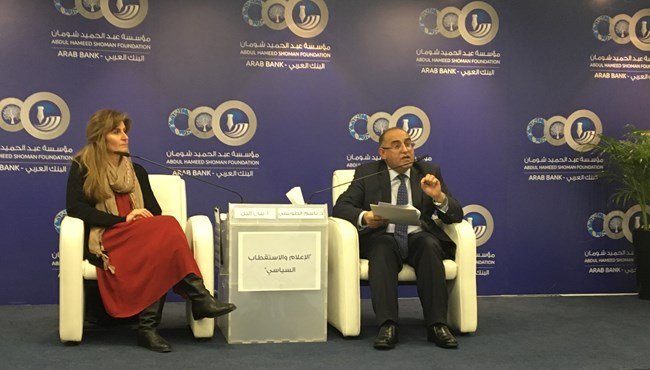Image:

07 Mar 2018
<br />
Dr. Basim Tweissi, dean of the Jordan Media Institute, said that Arab media offered the worst example of political polarization in the wake of the Arab Spring. He pointed out that professional media, which is based on independence and self-regulation, is the largest force to resist polarization, regardless of political temptations and the bad behavior of politicians.<br />
<br />
In a lecture he delivered at the Abdul Hameed Shoman Foundation titled "Media and Political Polarization," Dr. Tweissi said that political polarization is a feature of transitional phases. "It is not to be feared if it remains within its normal boundaries. However, if the phase of polarization continues for too long and applies to all political and social positions, then it will definitely go into a state of political madness, which will push any country, no matter how democratically immune, into a state of political and social division," he said.<br />
<br />
He added: "The media turns into an instrument of polarization when it becomes a part of the political game. It becomes a wild horse racing against other horses when politicians ride it and take it wherever they want. When these horses get tired, politicians ride others. The media becomes a pliable tool to divide society when it abandons its professional values of balance, accuracy, and credibility. Instead of playing a role of monitoring the pockets of politicians and businessmen, it monitors the minds of people and gets into the pockets of politicians and merchants."<br />
<br />
The dean of the Jordan Media Institute noted that the contribution of the media to polarization increases when conflicts get more severe and when they strike deep into society. This also happens when professional media declines and politicians and religious leaders are allowed to lead the media scene.<br />
<br />
Tweissi gave a number of examples of political polarization, including the sectarian political polarization in Iraq after 2003, the official political versus religious political polarization in Egypt, and the religious political versus secular political polarization in Tunisia and Libya. This is in addition to regional sectarian political polarization.<br />
<br />
Tweissi said that "Arab media outlets have become hostage to capital and inclinations of new businessmen. They failed to separate their editorial line from ownership, which is the first rule to develop professionalism. The Arab private sector, which owns 92% of Arab satellite channels, around 94% of the Arabic daily press, and around 98% of the digital press, has failed to build successful economic models based on professionalism and the ability to compete and win the trust of society."<br />
<br />
The methods and tools of media polarization in the Arab environment, according to Tweissi, include "demonizing the other, disinformation, political lies, creating terms and concepts, employing language, categorization, stereotyping, assigning roles, and controlling the Internet. This is in addition to the emergence of the power of activists and influencers or social, political, or religious forces that could be limited in number, but have a great impact. There is also the power of the TV scene." <br />
<br />
Tweissi said that any media plan or strategy to counter extremism or severe political polarization must begin with reforming media, strengthening professionalism, and reforming journalism education systems at Arab universities, institutes, and schools to have more professional and competent journalists. <br />
<br />
At the end of the lecture, which was moderated by Bayan Tal, adviser at the Jordan Media Institute, Dr. Tweissi and the attendees had a discussion that focused on the role of new and digital media in societal and political divisions and how to develop self-regulation of the media in a professional manner so that the media will not work for one party at the expense of another. The discussion also addressed the role of soft media, such as theater, cinema, and other cultural tools to avoid the state of polarization experienced by any society.<br />



